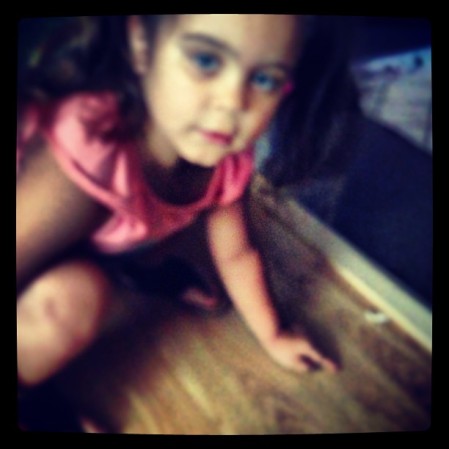by Luisa Milano

She tells me that my vitals are fine. With heavy wires taped to my chest, I nervously laugh a little and squeeze the nurse’s hand. “Check my pulse again, just one more time,” I plead. I bring my wrist to her fingers until she gives in. Her index finger gently presses against my skin until the rhythmic beat of my body affirms that I am in fact alive.
“Honey, you’re panicking. I need you to breathe with me,” the nurse says. I feel her pat my head, pressing her fragile fingers on my matted hair. She’s trying. She probably thinks she’s doing a good job, figuring that her calculated treatment is working. I’m tired of resisting, so I let her satisfaction settle.
The hospital’s staff assured my skeptical parents that Silver Hill was a state-of-the-art facility, settled and surrounded by freshly manicured lawns and hillside mansions. Take a stroll through the hospital’s grounds and you’ll feel like you made it to the Ivy League. Yes, you’re sad. Yes, you want to die. But if you can dish out 1,000 dollars a night, at least you can be suicidal in style.
Silver Hill rests in New Canaan, a small suburb of Connecticut located 40 miles outside of New York City. The town has an unseemly large population of sheltered rich kids with popped collars and Birkenstocks. They leave the local high school suffering from moral decay, but well versed in the menu at Sugarfish and the seasonal colors for the Lilly Pulitzer spring season. The backgrounds of the students that pass through New Canaan echo the backgrounds of the patients that pass through the hospital: we’re all unapologetic rich kids, but some of us cry more.
To get onto the campus you have to drive down a winding road with polished grass. When you arrive, smells of cherry blossom trees and meadow-fresh mint wash over you. The scent lingers on your clothes long after you leave. It’s almost formulaic — a constant reminder of the hospital planted on your jean jacket. Supple, crisp trees hover over the six white Victorian buildings that house the patients. The trees watch you as you walk to the gym across campus, as you pet the golden retriever therapy dogs, as you curl up by your window with your assigned self-help workbook.
Today, Silver Hill offers specialized inpatient programs for all spectrums of the broken. If you cannot think about eating a piece of cheese without wanting to kill yourself, there’s a bed for you. If you bite your skin until you draw blood, there’s a bed for you. If you’re like me and cannot walk past a car without wanting to jump in front of it, there’s a bed for you, too. I like to think of the historical reputability of this place as comforting. But I don’t want to be here. I squeeze my wrist and transfer my gaze back to the nurse. She looks back at me, smiling.
*
I’m in bed plotting my escape when I hear knocking at the door. I move my body out of the fetal position, sliding the heavy comforter down beneath my waist. The door clicks.
“Luisa, are you awake?” I look up dazedly at the nurse who’s standing beside a girl around my age. She’s beautiful. A messy pixie cut feathers around her high cheekbones, and she’s fidgeting with the zipper of her too-heavy jacket. Even with her ruined mascara, there’s a certain grace about her — a punk Audrey Hepburn.
We make brief eye contact before I transfer my gaze back to the nurse. “This is Tess. She’s gonna be your new roommate.”
As I stand up to greet Tess, a pang of dizziness rolls through my body. I struggle to ignore it. After a few moments, I assert my stance on the scratchy rug. “Hi, I’m Luisa,” I say. The nurse smiles and leaves the room.
“I’m Tess! Where are you from?” she asks as she makes her way to her side of the room, dropping a black duffle bag at the foot of the twin bed. She’s sweet, unexpectedly approachable; I forget that hot people can be nice.
“Millburn, New Jersey?” I examine her face to detect any familiarity. She looks at me blankly. “It’s like an hour and a half from here. It’s pretty shitty. How about you?! Where are you from?” I sound too eager. I sound like I haven’t spoken to anyone in three days. There’s a cool apathy that often comes with being depressed. I never got it quite down. Instead, I speak with exclamation marks and run-ons.
“I’m from Newtown,” she answers. She looks down at her feet, staring intently at her red Doc Martens.
“Newtown, Connecticut? Where the shooting happened?” I ask. She nods.
“It’s part of the reason I’m here. I knew some of the kids.” she says as she begins to unpack her clothes, folding each graphic t-shirt with precision and care.
I’m horrified and intrigued. The temptation to ask questions seizes me, but I repress the impulse. I think back to two months ago. I think about my distressed English teacher sitting our class down, taking her glasses off. Hugging her arms as she explained what happened the day before. The 20 elementary school kids murdered. The six teachers killed trying to save them. I look back at Tess, startled by the uneasiness that the memory brings.
Tess asks me more questions about the usual hospital-related experience: when I got here, how I got here, how much I mind being here. The ease of our conversation calms me, and for the first time in a while, my mind feels a little less heavy.
*
As we make our way to the dining hall, the faintness rushes back into my body. It moves swiftly from my toes to my knees to my brain. Tess’s words fade out and her muffled voice lingers in the air. I smile when there’s silence between us, saying ‘yeah, yeah’ to distract and fill up the space. It’s happening again. I clutch my sweaty palms together, squeezing and unsqueezing them. I can’t have this happen again. My eyes turn reddish, desperate, weary. She looks at me, asking if I’m okay. She asks what she can do. I dodge her questions, letting my short, loud breaths speak for themselves. How do I get out of this place? I need to find a way to get out of this place. Tess presses her hand on my shoulder. “Luisa, I want you to squeeze my hands. Squeeze as hard as you can.” She places open palms in front of me. “Come on.” I comply, gripping each bone, each wrinkle, each sweaty finger. “Harder. Count to ten. Count with me,” One. Two. Three. Chest rises, heavy eyelids close. Four. Five. Six. Muscles tighten, belly expands. Seven. Eight. Nine. Hands tighten, bones crack. Ten. I free Tess’s hands from my grip. I breathe out a burning ball of air.
It doesn’t fix everything. It doesn’t work like Xanax. It doesn’t mitigate the discomfort in the way yogis tell you it will. But for a moment or two, I feel a soothing wave collapse over my body. It’s like taking a hot bath after a wretched day, like being handed a tissue during a messy cry.
*
It occurs to me that I’ve hardly eaten in three days. I stare at the chocolate shake that the nurse has placed in front of me and think about sipping it, but even the thought of toast makes my gut clench. “Do you have a history of disordered eating?” the nurse inquires, like a dentist asking about the last time I flossed. I look down at my hands and pull back the skin below my nail. I glance across the room and find Tess looking at me. She smiles sympathetically. I look back down at my hands and rip the skin off in one piece.
During the evaluation days before I met Tess, a doctor interrogated me like a policeman before a murder witness. The stranger, a lanky middle-aged man, fired questions at all of my angles, scrutinizing every tremble, every breath, every half-hearted shrug. He viciously scribbled his observations down in a notebook as I huddled in my dad’s arms, clutching his hand, begging him to take me home. “Answer the doctor’s questions, Luisa,” he told me. My eyes swelled as I felt him loosen his grip with every response I couldn’t give. My mom sat isolated on the four-seater sofa, hunched over on the far end, pressing bitten-up nails against her forehead.
Three weeks before the evaluation, my tutor-turned-confidant informed her about all the money I had stolen: the way I would sift through my mom’s wallet, take her credit card, walk to the nearest pharmacy, and withdraw a couple of hundred dollars from her account – my own mother’s account. I spent the money on overpriced jeans and weed that I didn’t know how to smoke. I blamed it all on the divorce. I blamed it on the depression. I blamed it on the psychosis of adolescence. But when my mom confronted me, shaking and horrified, I found myself slowly withdrawing from each rationalization. Since the experience, we had hardly spoken.
During the evaluation, I left parts of my history out, keeping whatever I could unshaken and detached from outside analysis: the bulimia, the bully, the boy after math class. I only gave away the information the doctor would find out anyway, everything my mom and dad already knew. And they divulged everything they knew, which was plenty.
My dad spoke about the panic: the way I wake up paralyzed, curled onto my side, hyperventilating into pillows, blankets, soggy stuffed animals. As he went on about the emotional regression, I fidgeted with the sleeve of the worn-out hoodie I had bought two weeks ago. I dodged his eyes every time they looked my way.
My mom talked more about the self-destructive parts of the chaos and had no problem disclosing all of the messiness that encompassed our home life. “She can’t travel. Her body shuts down. When she’s not at home, she stops eating, drinking, sleeping. What is she going to do when she goes to college?”
The doctor took in the distress that circulated in the room, anchoring his gaze to my mom’s hands that lay buried between her thighs.
*
It’s daytime, springtime. It’s been two weeks since I arrived here. Ten days after I first met Tess. One week after the Cymbalta began to kick in. I’m in the dining hall. The nurse stares me down as I fiddle with a heavy fork and uneaten bits of cheesecake. Tess sits beside me, along with two other girls that joined the program a few hours ago. We’re all making clumsy small talk, and trying too hard to casually consume all that is placed in front of us. We overtly gulp. We take sips of water in between bites. We cut each substance on our plates into a million pieces. We pretend food is cardboard, tough and laborious to eat.
“I’m Sam,” one girl says. She looks up at me, smiles, and plays with the strap of her tight white tank. I introduce myself and compliment her hair. It’s blond and long and lush and shaggy. She giggles and curls a front strand with her thumb and index finger.
Sam is dripping with sex appeal, so much so that I’m convinced we’re seriously flirting as we begin to talk about the weather. “It’s been freezing,” she says, holding eye contact long after the “ing.” I play along out of boredom: tousling my hair, squinting my eyes, brushing my fingers against the smooth parts of my skin. The back and forth ignites something tender in the space between us. It’s not all-consuming or compulsive or sweaty. It’s just nice, like a sweet daydream.
After dinner, we make our way toward upper-campus, passing by the mid-day meditation group, the 20-somethings on a smoke break, the daffodils blooming in the garden. Tess dances funnily along the pavement, wearing black tights under high-waisted jean shorts. Sam stands next to me — we laugh and cheer Tess on. “Dance, Dance, Dance!” The nurse follows behind. She tells us to keep our voices down, reminding us to prepare for group therapy in an hour.
When we arrive at the residential house, we are told to go around and locate our emotions on a scale of one to ten. It’s a daily procedure, one that provokes eye rolls and faint responses. We’re jaded. We’ve done this before. The first days I was there I stayed on two. On optimistic days, I’d give them a four. But today there’s a softness that moves through me. I find Sam looking at me. I find Tess brushing her fingers through her pixie-cut, smiling in my direction. “Six,” I say. And I mean it. The therapist looks up at me perplexed but proud, as if her existence somehow inspired some crisp revelation that led to my better mood.
Continue reading












